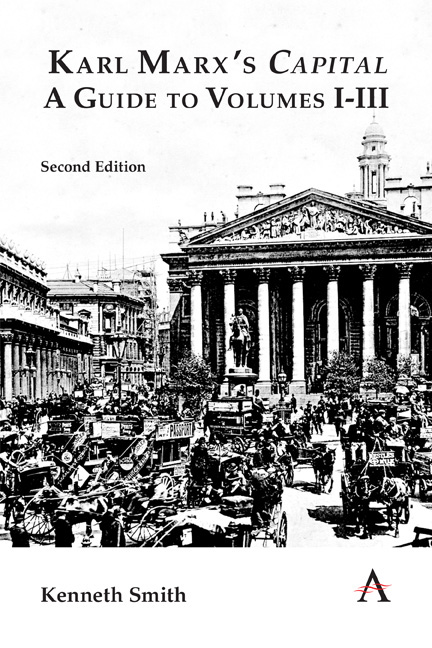Book contents
- Frontmatter
- Dedication
- Contents
- Preface to the Second Edition
- Introduction
- Part I The Development of the Capitalist Mode of Production
- Part II The Capitalist Mode of Production
- Part III The Underdevelopment of the Capitalist Mode of Production
- Part IV The Value Theory of Labour
- Conclusion to Part IV
- Conclusion
- Appendix: On Social Classes
- Notes
- Bibliography
- Index
2 - Cooperation and the Division of Labour in Capital, Vol. I, Ch. 13–14
Published online by Cambridge University Press: 17 April 2021
- Frontmatter
- Dedication
- Contents
- Preface to the Second Edition
- Introduction
- Part I The Development of the Capitalist Mode of Production
- Part II The Capitalist Mode of Production
- Part III The Underdevelopment of the Capitalist Mode of Production
- Part IV The Value Theory of Labour
- Conclusion to Part IV
- Conclusion
- Appendix: On Social Classes
- Notes
- Bibliography
- Index
Summary
In this chapter we will look at two topics which at first sight seem to be quite different from, or even opposed to, one another: cooperation, i.e. the coming together of labour in the work place, and the division of labour, i.e. the separation of the various parts of the labour process into its constituent parts. However, in so far as manufacturing industry is concerned, Marx argues that these two processes are really just two sides of the same coin, and in fact, Marx actually defines manufacturing as cooperation based on the division of labour (1974a, 343 [1976, 485]).
In Chapter 13, Marx looks at various types of simple cooperation which do not involve a sophisticated division of labour; for example, when everyone helps to harvest a crop or dig a canal. This type of cooperation is necessary because there are certain things that one cannot usually do by oneself (such as lift a heavy rock, or tie a ribbon on a cake box). If one man can dig a canal or build the Great Wall of China in 14,000 years, 14,000 men can do this same thing in one year. Cooperation therefore makes possible the development of certain forms of agriculture and industry that would simply be impractical for an individual alone. However, this type of cooperation also imposes certain communal expectations and demands on the individual over and above those required in a typical nuclear family; where, for example, the help of many other individuals is required to harvest a particular crop within a given period of time – rice for example before it rots in the field – or where watering this crop requires the construction of large scale irrigation works (see 1974a, 481 [1976, 650] for more on this).
However, there are other forms of cooperation which involve a division of labour; for example, where some labourers harvest a crop, others thresh this, and still others make the crop or its waste product into bales for storage or transportation. This is the type of cooperation based on a division of labour characteristic to the manufacturing period of British industry which Marx argues, properly so called, extended from about 1550–1775 (1974a, 318 [1976, 455]).
- Type
- Chapter
- Information
- Karl Marx's 'Capital': A Guide to Volumes I-III , pp. 23 - 26Publisher: Anthem PressPrint publication year: 2021



